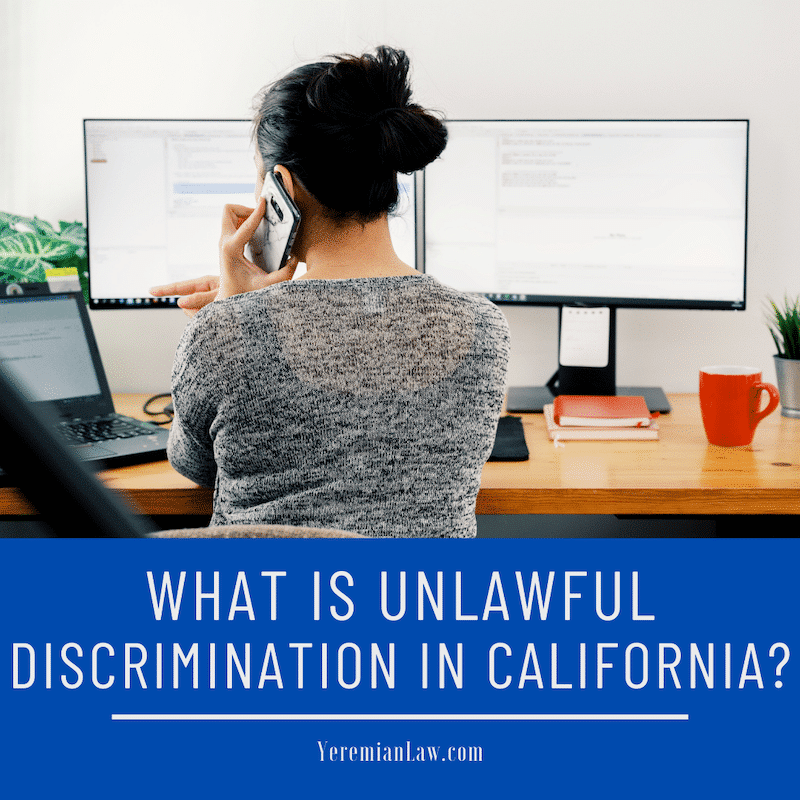In the state of California, employers aren’t allowed to discriminate against workers who fall into one of several protected classes. But not all discrimination is unlawful – even if it’s distasteful. So what is unlawful discrimination in California, and what can you do if you’ve been a victim of it? This guide explains.
What is Unlawful Discrimination in California?
Discrimination is unlawful in the state of California when it occurs against a person of a protected class, and when it occurs as a result of that person’s membership in a protected class. The protected classes in California are:
- Age
- Ancestry
- Childbirth
- Color
- Disability
- Gender
- Gender expression
- Gender identity
- Genetic information
- Marital status
- Medical condition
- Military or veteran status
- National origin
- Pregnancy
- Race
- Religious creed
- Sex
- Sexual orientation
If a person is discriminated against for a reason outside those – or outside other protected characteristics outlined in federal or state law – it’s likely not illegal. For example, if an employer refuses to hire you because your favorite color is yellow, that’s not against the law (though it is a stupid reason to discriminate against someone).
Related: Gender identity and gender expression discrimination in California
When Discrimination is Unlawful in California
Employers are not allowed to discriminate when they are:
- Recruiting new workers
- Reviewing applications
- Interviewing or selecting job candidates
- Requiring pre-employment testing
- Conducting background investigations
- Hiring workers
- Compensating workers
- Offering benefits to workers
- Creating working conditions
- Choosing workers for promotion, transfer or demotion
- Deciding which workers may take leave
- Conducting disciplinary actions or other adverse employment actions
- Laying off employees
- Terminating employees
Related: Different types of workplace harassment
What Laws Protect California Workers?
The California Fair Employment and Housing Act, or FEHA, provides strong protections against discrimination. It applies to employers that have five or more full- or part-time employees. Federal laws also exist to protect California workers (and workers from other states), though they only apply to larger employers (such as those with 15 or more employees).
Types of Unlawful Discrimination in California
There are two main types of unlawful discrimination in California: disparate treatment and disparate impact.
Disparate Treatment
Disparate treatment occurs when an employer treats someone differently (less fairly) based on their membership in a protected class. For example, if an employer considers someone’s race in choosing who to fire, age (over 40) in deciding who not to hire, or medical condition in determining who’s eligible for certain benefits, that’s disparate treatment – and it’s illegal.
Disparate Impact
Disparate impact occurs when an employer adopts a practice or policy that seems nondiscriminatory but has a disproportionately negative effect on members of a protected class. For example, it seems nondiscriminatory to require employees to be clean-shaven – but in the past, policies like that have had an adverse effect on African-American men who are disproportionately affected by a shaving-related skin condition. The employer may not intentionally discriminate with a policy like this, but it has the effect of discriminating, so it’s unlawful.
What Can You Do if You’ve Been Unlawfully Discriminated Against?
If you’ve been discriminated against, whether it was intentional or through a policy that seems non-discriminatory on its face, you may have legal recourse. You should document everything related to your case and contact an attorney.
In the case of a potential disparate impact case, you should obtain a copy of your employer’s policy (it may be in your employee handbook, on the employer’s website, or posted in a common area, such as the break room at your place of employment). You should also detail how you believe the policy or practice has a negative effect on you and others who are members of the same protected class.
Do You Need to Talk to an Attorney About Unlawful Discrimination in California?
If you need to speak to an attorney about unlawful discrimination in California, we’re here. Call us at 818-230-8380 or fill out the form below to set up your free consultation with an experienced employment discrimination lawyer in Los Angeles now.





